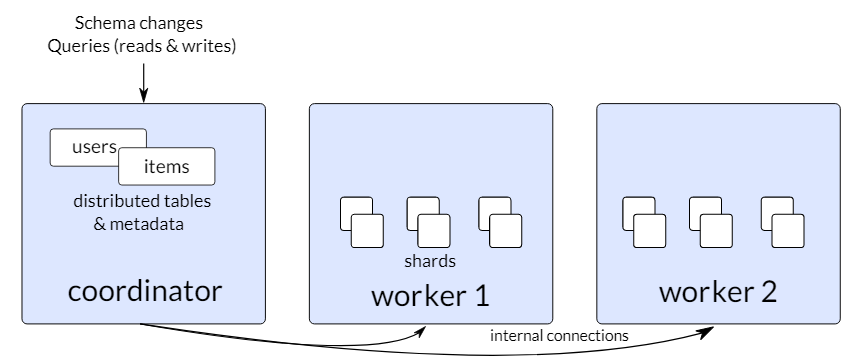| Citus For PostgreSQL Goes Fully Open Source |
| Written by Nikos Vaggalis | |||
| Monday, 04 July 2022 | |||
|
Citus, the PostgreSQL extension that transforms Postgres into a distributed database, has gone completely open source with latest release, version 11. I say completely, because some parts, like the shard rebalancer, had already been open sourced in earlier versions. This version however open sources everything.
But first a few words about Citus. As with other extensions that give PostgreSQL superpowers, Citus enhances Postgres with :
Oracle Database and IBM Db2 both provide a shared-nothing architecture (each node in the cluster has its own compute and storage) as separate features and with Citus, PostgreSQL could do so very much too. Along with this you could also scale out horizontally by adding more servers to Citus' clusters and rebalance data from the already existing servers to the new ones without downtime. Open sourcing, makes the Enterprise Edition's extra features available to all. These include:
But the biggest changes v11 (v11.0.2 as of this June) has over its predecessors are: dropping support for PostgreSQL 12 that the schema and Citus metadata are now automatically synchronized throughout the database cluster therefore you can always query distributed tables from any node in a Citus cluster. and the introduction of the non-blocking shard rebalancer under which Citus can move shards around by using logical replication, hence your application will only experience a brief blip in write latencies when scaling out the cluster by moving existing data to new nodes. If you think that with those features Citus sounds more like a complete PostgreSQL version than a mere extension,you'd be aligned with the voices that call for its merging into the main PostgreSQL branch. Despite that Citus will remain as is, a separate extension. So much power inside a single 7MB zip file source distribution... Get 11.0.2 from Github. More InformationRelated Articlespg_ivm - Materialised Views On Steroids AGE - The Open Source PostgreSQL Extension For Graph Database Functionality To be informed about new articles on I Programmer, sign up for our weekly newsletter, subscribe to the RSS feed and follow us on Twitter, Facebook or Linkedin.
Comments
or email your comment to: comments@i-programmer.info |
|||
| Last Updated ( Monday, 04 July 2022 ) |




